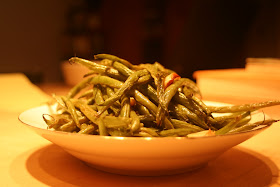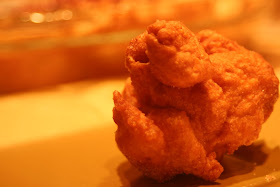Tonight's dinner was supposed to be a Black Bean Soup that I read about on the Eats Well With Others blog. That plan quickly fell apart because a) there was no mango juice to be had in this entire snow-struck town, and b) I realized that the recipe called for four ingredients that at least one member of my family won't go near (cooked peppers, cooked tomatoes, cilantro, and cloves). SIGH. I'll eat just about anything. But there are some picky eaters in my household.
The beans were soaking away happily so there was no turning back. (Not that I wanted to, I was pretty excited about the hearty bean soup thing, especially after braving the cold to find mango juice.) So I decided to create my own version. It turned out really good. If you care to check out the original recipe on Eats Well With Others, you'll see lots of similarities (and MUCH prettier photos; mine just didn't come out very good). Thanks for the inspiration, Joanne.
Black Bean Soup
The original recipe, on Eats Well With Others, recommends that you keep the water that the beans have cooked in and use it in the soup. I know that this technique makes for a tastier soup, but I find that draining the water and using a fresh batch in the soup makes the beans more digestible. If you're not sensitive to beans, feel free to use the cooking water.
1 cup dry black beans, soaked overnight in cold water
1 tbsp olive oil
1 medium onion, chopped
2 carrots, chopped
4 cloves garlic, chopped
3/4 cup orange juice
1 tsp ground cumin
1/8 tsp cayenne pepper
1/2 tbsp lime juice
Yogurt or sour cream (optional) for serving
Drain the beans and place in a medium stockpot covered with water. Bring to a boil and simmer, covered, for about two hours until tender. Drain and set aside.
In a large frying pan or shallow pot, heat the oil and then saute the onion and carrot until softened, about 5 minutes. Reduce the heat to low, add the cumin and garlic and cook, stirring occasionally, for another 10 minutes. Add the orange juice to the pan and cook uncovered on medium-low heat for 15 minutes longer.
Remove the pot from the heat and use an immersion blender or food processor to blend the soup until smooth. Keep warm over low heat if needed.
Drain the beans and place in a medium stockpot covered with water. Bring to a boil and simmer, covered, for about two hours until tender. Drain and set aside.
In a large frying pan or shallow pot, heat the oil and then saute the onion and carrot until softened, about 5 minutes. Reduce the heat to low, add the cumin and garlic and cook, stirring occasionally, for another 10 minutes. Add the orange juice to the pan and cook uncovered on medium-low heat for 15 minutes longer.
Pour the onion mixture into the stockpot with the cooked beans. Add enough water to cover the beans (it will be around three cups), plus the salt and cayenne. Bring the soup to a simmer and cook on low heat for about 1/2 hour, checking the water level occasionally. (Add more if needed.)
Remove the pot from the heat and use an immersion blender or food processor to blend the soup until smooth. Keep warm over low heat if needed.
Right before serving, stir in the lime juice. Serve hot, garnished with yogurt or sour cream if desired.


























 Braiding
Braiding




















